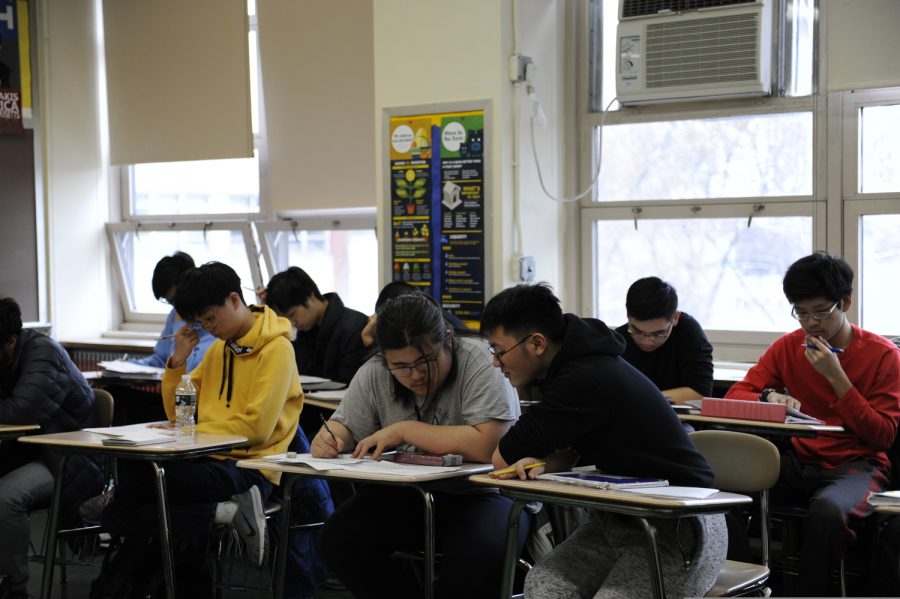COVID-19’s Impact on the Global Economy
Students in AP Economics and Government are learning about the causes and effects of a global recession while learning remotely due to the Coronavirus pandemic.
Some say “life is like a rollercoaster,” but billions around the world are not thrilled on this ride.
Global stocks had been tumbling due to the ongoing COVID-19 pandemic, but they have undergone a recovery as of late. As of this writing, they are only 12% down from their all-time high in February 2020. In March 2020, the Dow Jones Industrial Average fell nearly 8,000 points over a two-week period, which accounts for about thirty percent of the world’s stocks. Although many stocks around the world point towards another recession, investors have turned to Amazon and medical stocks in hopes of large returns. One junior investor has bought shares of the medical stock Abbott and said, “This is the perfect time to learn about investing since there is such a low risk while supporting their efforts.” While there are many stocks available, it is always a good idea to research the stock before buying.
As of May 6, 2020, American unemployment claims have topped thirty-three million, accounting for about twenty percent of the American workforce, leaving many to wonder how they will survive through the summer. In March 2020, Congress enacted the largest stimulus package to date with a two trillion dollar investment, but this aid ran out after just thirteen days. Individual Americans were promised $1,200 of federal relief by Congress with some restrictions. However, many encountered problems when receiving their relief money. There have been reports that banks have used the federal stimulus money to pay off debts, rather than depositing it into their client’s accounts. A fourth relief package totalling $484 billion with hopes of stimulating the economy to prevent another recession was cleared, but so far, the U.S. economy has wiped out all job gains since the Great Recession. Around the world, predictions have estimated the wipe out of the equivalent of 195 million jobs.
Globally, some countries such as South Korea and Germany have begun to reopen their economies by relaxing once strict social distancing and quarantine orders as the number of daily new cases has steadily decreased. Fears of a second wave and reversing the flattening of the curve are preventing many countries from reopening, however. In the United States, mayors and governors have decided to reopen on their own terms, while President Trump supports rallies to ‘liberate’ such states as Michigan, Virginia, and Minnesota. He has explicitly expressed support for the protestors of lockdown and quarantine orders in order to reopen the economy as quickly as possible. To counteract these actions, several states have joined pacts to jointly reopen their economies in the safest manner possible.
As a part of the Multi-State Council in the Northeast, Governor Andrew Cuomo has coordinated New York ‘s reopening in stages and has sights to start reopening upstate by mid-May 2020. Mayor Bill de Blasio envisions a fair recovery for all New Yorkers, making sure that the hardest hit are provided with care. He plans to create sector advisory councils, such as the Labor and the Education Councils, to directly address specific challenges in each of these departments.
Due to the lack of transit throughout the world, countries which rely heavily on oil exports are facing hard times. Countries such as Iraq have been hit hard since ninety percent of the government’s revenue comes from oil alone. Mexico, Venezuela, and Ecuador have been in a recession since 2019, and these countries are struggling to stay afloat amid the global pandemic, falling prices, and political corruption. In addition, oil prices in the United States fell to forty dollars below zero on April 20, 2020, meaning that producers were paying consumers to take oil off of their hands due to a lack of storage space.
As the quarantine continues, we can only look forward with the hope that the United States recovers quickly and safely. Around the country, families that are food insecure have been receiving federal help, but one of the best ways to help in your community is to provide for neighbors or friends who need assistance. Shopping at local businesses ensures that your favorite stores will be able to stick around once we reach a new normal.
“This is the perfect time to learn about investing since there is such a low risk while supporting their efforts.”
Russell Kwong is a Copy Chief Editor for 'The Science Survey.' In his second year of journalism, he enjoys reading 'The New York Times' online to learn...
Lola Murti is a Chief Graphic Designer for ‘The Observatory’ yearbook. She likes journalistic writing because it provides an opportunity to help share...











